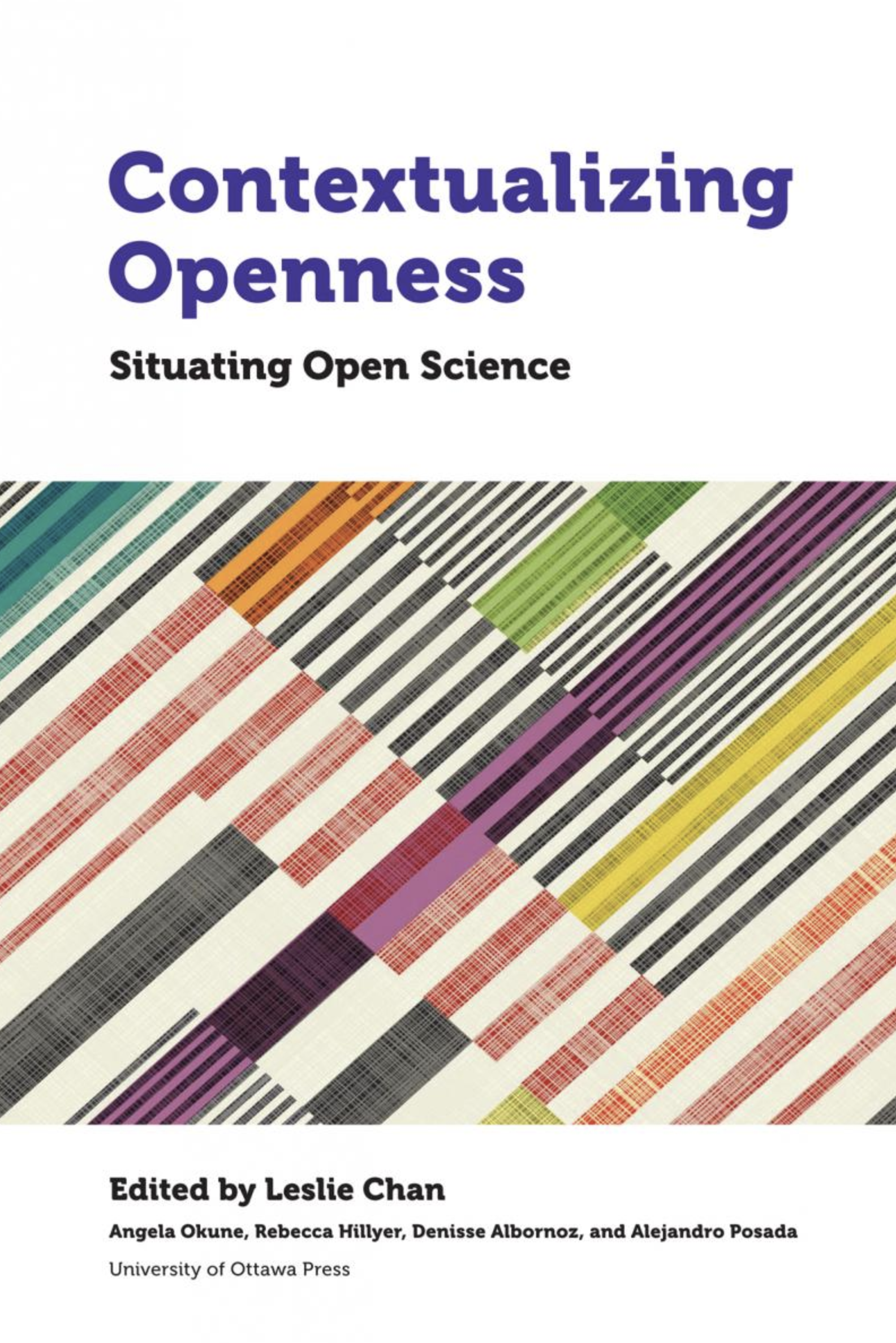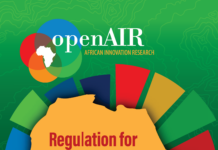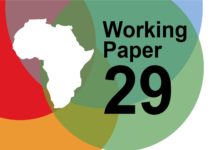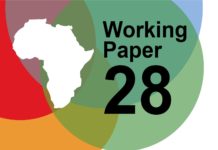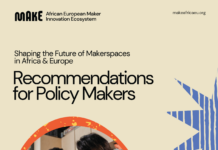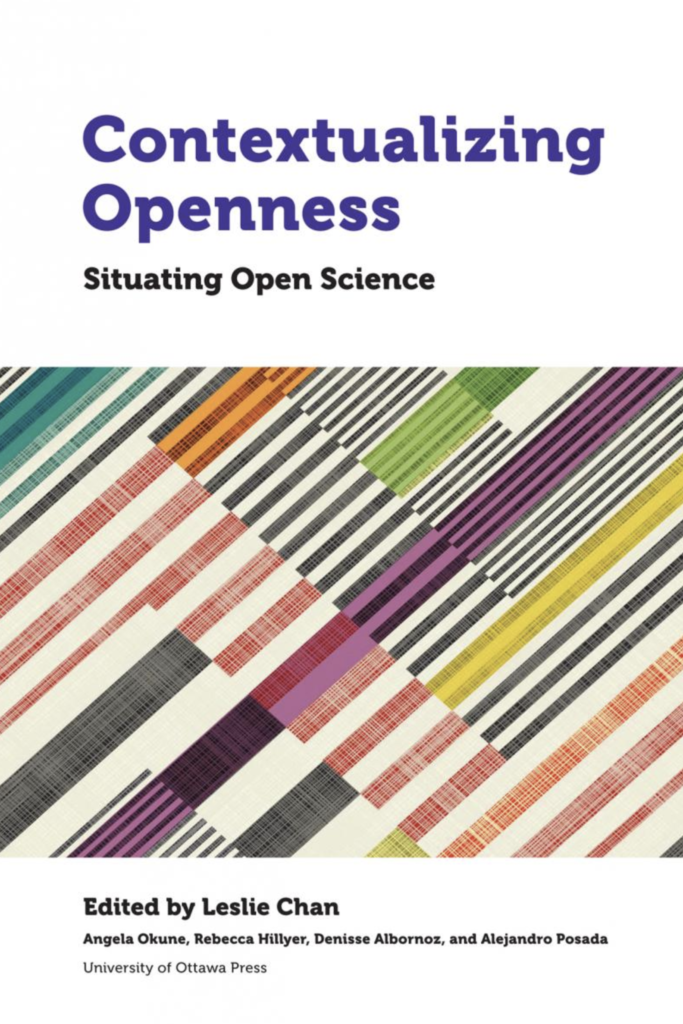
Contextualizing Openness: Situating Open Science
Edited by Leslie Chan
Angela Okune, Rebecca Hillyer, denise Albornoz, and Alejandro Possada
Published by Ottawa Press
Available online from the IDRC Canada.
CHAPTER 10
Tensions Related to Openness in Researching Indigenous Peoples’ Knowledge Systems and Intellectual Property Rights
Cath Traynor, Laura Foster, and Tobias Schonwetter
Abstract
This chapter explores issues of boundaries in practices of Open Science regarding research involving Indigenous peoples in South Africa. We start considering colonial notions of “science” and “openness,” and how historical injustices and lack of redress influence the context in which our current research sits. Our research broadly aimed to develop a political, ecological approach to understanding the relationship between climate change, intellectual property, and indigenous peoples. Our approach was influenced by “decolonizing methodologies” and feminist perspectives, and we employed participatory action research methodologies to guide not just the substantive, but also procedural elements of the research. We discuss our experience with developing “community-researcher contracts” in an attempt to make ourselves as researchers more accountable to Indigenous Nama and Griqua communities and to adequately protect their Indigenous knowledge. The challenges of negotiating the contracts is described and how we conceptualized the concept of a “situated openness”—a way of doing research that assumes knowledge production and dissemination is situated within particular historical, political, socio-cultural, and legal relations.
Contents
- Introduction
- Historical Background and Conceptual Framing of the Project
- Community-Researcher Contracts
- Difficulties Developing the Community-Researcher Contract
- Conclusion
- Notes
- References
Introduction
This chapter offers preliminary field notes on the practice of engaging in an open and collaborative research project that involves multiple scales of histories, geographies, institutions, and ways of knowing. We have been engaged in a two-year collaborative project with a team of Indigenous community leaders, academics, and lawyers examining issues of climate change and Indigenous knowledge. Our team includes Cecil Le Fleur (Griqua National Council) and Gert Links (Richtersveld Traditional Nama Council), as well as the three authors of this chapter, Laura Foster (Indiana University), Tobias Schonwetter (University of Cape Town), and Cath Traynor (Natural Justice). Our project was supported by the Indigenous leaders, who suggested we interview members of their communities concerning their understanding of the impact of climate change and the role of Indigenous knowledge in climate change adaptation.
In doing this research, we have been mindful of how the varied geographies of Nama, Griqua, South African, and American nations and the multiple histories of colonialism, apartheid, and post-apartheid shape our work. We have learned much from navigating the different institutional worlds of Nama and Griqua councils, academia, and non-profits. We have also become more familiar with the different and similar traditions of producing and disseminating knowledge that each of us are located within—Indigenous peoples’ knowledge, feminist studies, scientific studies, legal studies, and ecology. In doing this work, we have focused on the very process of doing research in order to understand the relations of power that enable and limit possibilities for open and collaborative research. A central finding of our research has been that efforts to adapt to climate change, which involve or will impact Indigenous peoples or their lands and resources, must begin with developing more socially just ways of doing research.
As principal investigator and manager of this collaborative project, Cath Traynor’s learning and contributions to the project were guided by her experience as an ecologist and non-profit practitioner with Natural Justice. The mission of Natural Justice is to work collaboratively with those Indigenous and local communities who seek them out for legal expertise on how to secure their rights to land, resources, knowledge, political representation, and self-determination more broadly. Her main interest in the project was therefore aimed more at developing practical strategies for adequately protecting Indigenous peoples’ knowledge. What became apparent, however, was the need for community-based research contracts that would ensure practices of open and collaborative research that meet the needs and interests of Indigenous peoples. Although the drafting and negotiating of these contracts are ongoing, we offer some initial fieldnotes here on how certain policies at the international, national, and university level shaped the drafting of these contracts and the collaborative research practices that they seek to promote. Open and collaborative research requires recognition of different knowledge and writing practices; thus, our choice to frame this chapter as fieldnotes is a deliberate attempt to push back upon the hegemony of academic scholarly expectations that can hinder truly meaningful collaborative research practices.
Historical Background and Conceptual Framing of the Project
Nowadays, open and accessible systems and practices are seen in many areas as a crucial engine for innovation and socio-economic development, particularly in Africa through, among other things, facilitating collaboration and improving transparency and accountability. But openness is not an end in itself, and there are potential downsides to openness, especially if only some elements of openness are asserted in a one-sided, exploitative, and selective fashion. Where this has happened, a more nuanced, “situated” approach to openness is required to account for past injustices and to prevent further harm to those affected. This collaborative project requires a situated approach to openness as the notions of science as “open” and nature as “freely accessible” have historically been invoked to exploit countries such as South Africa. For example, British and Dutch colonial scientists characterized resources in South Africa as “belonging to no one” under the doctrine of terra nullius in order to take biodiverse plants and produce botanical science. To the extent that their activities involved appropriation of such materials and research results, the colonial scientists appeared, however, to be less concerned about openness and free accessibility for all. Indeed, the terra nullius doctrine was not restricted to science, but widespread among colonial authorities, who used the principle and that of mise en valeur1 to justify land seizures from Indigenous peoples, most of whom were mobile land users such as hunter gatherers or pastoralists and therefore did not meet the colonists’ criteria for occupation of lands (UN 2012).
In these cases, the notion that knowledge and resources should be open and accessible has therefore been historically misused to cast countries in the Global South, including South Africa, as suppliers rather than producers of knowledge, and in particular, Indigenous peoples’ knowledge, resources, and heritage as free for the taking. Furthermore, Indigenous communities within South Africa continue to face historical injustices as colonization, apartheid, and post-apartheid laws and policies have not fully taken their unique ways of life and culture into account. Thus, similar to other Indigenous communities in Africa, they have been severely marginalized, and many rights and freedoms enjoyed by their fellow citizens are inaccessible to them (Barume 2010). Most recently since the signing of the Constitution of South Africa in 1994, Indigenous communities have been engaged in struggles to right previous wrongs. For example, Nama pastoralists in Richtersveld initiated a court case2 in South Africa to reclaim the tenure of their ancestral lands. The Constitutional Court of South Africa ruled in favour of their land and mineral rights; as a result, in 2002, the International Criminal Court set aside3 the use of terra nullius as a justification for disenfranchisement. Presently, Indigenous representatives continue to advocate for recognition of Khoi and San customary governance structures; indeed, the Traditional and Khoi-San Leadership Bill (TKLB) has been introduced to the National Assembly, one of its key objectives being to recognize Khoi and San leaders in the formal, traditional leadership structures of South Africa. However, the Bill also seeks to address additional issues related to other traditional communities; thus, the Bill is highly contested by many communities, academics, and civil society (e.g. Makoena 2015).
The broad objective of our project was to develop a political, ecological approach to understanding the relationship between climate change, intellectual property, and Indigenous peoples. This approach sought to understand the relationship between these three facets and how political, economic, legal, historical, and socio-cultural processes structure them. The project employed participatory action research (PAR) design and methods with the aim of reducing the power relations within and between researchers/researched and hierarchies of knowledge production by involving marginalized groups within the design, implementation, and outcomes of the research. Rather than studying communities from the “top-down,” PAR takes a “bottom-up” approach by forming partnerships with communities to identify key issues of importance and develop ways of doing research, interpreting results, and taking action on the findings (Smith et al. 2010). This enables the research to better respond to the interests and needs of the community in ways that benefit them (Maguire 1996).
Our approach was informed by Linda Tuhiwai Smith’s (1999) concept of “decolonizing methodologies” that demonstrates how research practices have historically contributed to the colonization of Indigenous peoples. Models of Western knowledge production have been positioned as superior, which has engendered the devaluing of Indigenous peoples’ knowledge. Furthermore, we were also cognizant that the institutions we as researchers are part of (universities and an NGO) can be colonizing spaces themselves, and that we should also engage mindfully with the research requirements and processes of our own institutions. Our aim was to “decolonize” historical modes of producing knowledge by positioning Indigenous peoples as producers of climate change knowledge through open and collaborative PAR processes.
Given the histories noted above, our project was guided by an understanding of “situated openness.” Appeals for open and collaborative research are often based upon understandings of an open public domain where data and research results are meant to be freely shared and open to others. In arguing for a situated public domain, Laura Foster contends that norms of openness and sharing have historically been deployed by researchers to appropriate and exploit Indigenous peoples’ lands, knowledge, and resources (Foster 2011). A situated public domain is alternatively based upon norms of openness and protectiveness that allow Indigenous peoples to decide for themselves when, how, and to what extent their knowledge should be shared (Foster 2011). Building upon these insights, our project is framed through an understanding of a situated public domain that also demands a model of situated openness. Drawing upon Foster’s work and feminist science studies broadly, the understanding of situated openness requires us to consider how collaborative knowledge production is situated within particular historical, political, socio-cultural, and legal relations of inequality. Collaborative knowledge practices based upon norms of openness can democratize knowledge, but can, as mentioned above, also be misused to legitimize the taking of Indigenous peoples’ knowledge. What is needed are practices of collaborative knowledge production that involve simultaneous modes of being open, closed, sharing, and restrictive in order to democratize science in more meaningful ways for Indigenous peoples.
Community-Researcher Contracts
The demands for data and research results to be open and accessible to others created some tensions with our desire to protect Indigenous peoples’ knowledge and knowledge holders’ interests. Indigenous peoples have experienced histories of violence that have led to the taking of their lands, knowledge, and heritage—this includes experiences with academic researchers, even up to the present day. As a result, Indigenous peoples are sometimes less willing to share their knowledge freely without prior informed consent and meaningful collaborative consultation.
To counter those histories, our team sought to develop ‘community-researcher contracts’ between Natural Justice, Indiana University, the University of Cape Town, and the Nama and Griqua communities.4 These contracts are meant to clearly state expectations and responsibilities between parties, how the research will be conducted, and how knowledge may (or may not) be shared.
We also wanted to ensure that Indigenous knowledge (IK) and knowledge holders’ rights were protected in line with international laws. Several international law instruments specifically refer to IK5: for example, the UN Declaration on the Rights of Indigenous Peoples (UNDRIP) states that Indigenous peoples have the right to maintain, control, protect, and develop their traditional knowledge and the manifestations of their science (UN 2008, 11). The UN Convention on Biological Diversity (CBD) states that each Contracting Party to the Convention shall respect, preserve, and maintain the knowledge, innovations, and practices of Indigenous peoples (UNEP 1992, 6). However, there is no universally agreed-upon definition of IK, it is not addressed uniformly by the different instruments, and some of these instruments seek to protect IK by restricting access and use (Savaresi 2016). Furthermore, interpreting how these instruments and processes impact IK–related research in the relatively new field of climate change requires expert guidance. Indeed, many so-called “soft” international instruments such as the Nagoya Protocol of the CBD and the UNFCCC Paris Agreement give deference to national laws; thus, an understanding of the national legal landscape regarding IK is essential (Savaresi 2016).
At the national level, there may be specific laws and policies that simultaneously recognize international rights related to IK but also undermine them. Our project was focused on South Africa, which, since the end of formal apartheid rule in 1994, has been developing new laws and policies related to indigenous knowledge systems (IKS). Currently, the pivotal policy is the Indigenous Knowledge Systems Policy that is designed as an enabling framework to stimulate and strengthen the contribution of IK to social and economic development in South Africa (Republic of South Africa 2004). One of the key policy drivers is the affirmation of African cultural values in order to redress histories of subordination under apartheid rule whereby IKS and its practitioners were marginalized, suppressed, and subjected to ridicule. Furthermore, this policy notes that in regard to the protection of IKS, South Africa has a well-defined system of intellectual property rights; however, legal strategies for the perpetual protection of IKS through benefit sharing and/or joint ownership are continuing to be debated. To address shortfalls, a Draft Protection, Promotion, Development and Management of Indigenous Knowledge Systems Bill (hereinafter IKS Bill) was introduced into Parliament in 20156 and amended in 2016.7 The intention of this IKS Bill is laudable as it aims to establish a unique, so-called sui generis approach for the protection of IK instead of relying on existing IP frameworks to provide for such protections (Schonwetter, Jansen, and Foster 2015). The IKS Bill states that the ownership of Indigenous knowledge vests in the Indigenous community, that a trustee of the Indigenous community can hold the IK in trust on behalf of the community, and that this trustee shall be responsible to the community for the protection of their rights (Republic of South Africa 2016). However, as the IKS Bill is still under discussion and may change considerably, Natural Justice, as legal advisors to the communities, engaged by taking expert legal guidance on specific issues that would be in the best interests of the IK knowledge holders and discussing the various options and implications of specific text with community representatives. In addition to the IKS Bill, South Africa recently issued a draft Indigenous Knowledge Systems Research Ethics Policy8 that aims to protect communities and their IK, reduce the adverse effects of research, ensure that communities equally own data and information generated by the research, and ensure fair and equitable benefit sharing arising from the communities’ contributions to the research process. The Research Ethics Policy also emphasizes full informed consent and principles of confidentiality, empowerment, and prior rights.9
Difficulties Developing the Community-Researcher Contract
In developing the specific text of the “community-researcher contracts,” our project team experienced several difficulties, some of which are elaborated in more detail below. Because the project was a collaboration with universities as outlined above, we gained approval prior to starting research from the UCT research ethics committee (REC) and IU institutional review board (IRB). The REC/IRB approval certainly helped to ensure ethical conduct of human subjects research; however, we found that it very much focused on the individual and assumes that knowledge is individually held, which was incongruent with how indigenous Nama and Griqua communities related to their knowledge.10 These communities hold their knowledge collectively; thus we reasoned, should we also obtain collective consent from the community prior to conducting research and sharing our research outputs? In terms of the research process and timelines, we faced a conundrum. Although we could obtain collective buy-in from the leaders of the community prior to conducting research, the exact nature of the knowledge shared would not be known, which made obtaining collective community consent difficult. We were committed to obtaining individual consent from individuals with whom we spoke. We were also committed to returning to the community and/or their representative leaders to share with them what we learned and seek their collective consent to use and share our learning in our research.
The Community Research Contract needed to elaborate this dynamic process to ensure the collective element of IK was addressed and included as part of a broader ethics clearance process. It also needed to address several concerns: If Nama and Griqua peoples shared Indigenous knowledge with us, what safeguards were needed to avoid misappropriation? If our funders required us to make our “data” open and freely accessible, how could we fulfill these funder requests while ensuring adequate protection of indigenous Nama and Griqua communities? Indigenous peoples’ knowledge must not be publicly disseminated without their free, prior, informed consent (FPIC) at each stage of the research and its dissemination.
Communities have a right to FPIC, and an important part of this is “complete disclosure of the risks and benefits to individuals and the community of participation in the research” (Republic of South Africa n.d.). Thinking through different scenarios that could arise from sharing different elements of IK is required so these are considered upfront. For example, pastoralists may share the specific characteristics of their breeds of livestock, which enable the animals to cope with harsh environmental conditions such as excessive heat, drought, and limited forage. These characteristics could potentially be very valuable to other livestock keepers and breeders (including commercial breeders), and inadequate protection could increase the risk of misappropriation for the community.
As for international and domestic legal frameworks, how one interprets certain provisions is often key, and we found expert guidance from lawyers with practical experience in supporting Khoi and San communities in Southern Africa when negotiating access and benefit-sharing agreements regarding their IK valuable. Additionally, we needed to continually ask ourselves, “What does this mean in practice?” Interpreting the meaning of legal texts was no easy matter, and developing clear, practical statements and actions for the community-researcher contracts to ensure adherence was challenging and, at times, overwhelming.
Our project is an international collaboration; from a legal perspective, we also needed to consider that different laws and policies apply in different countries. For instance, South Africa’s laws and policies are, of course, only applicable within the country’s geographic boundaries, and South Africa is only bound to the international legal instruments to which it has adhered. We also needed to consider foreign legislative frameworks to determine what happens to the IK and knowledge holders’ rights when the IK leaves South Africa. This was particularly pertinent in our case, as one of our partners was based in the United States, which is a country that has signed but not ratified the CBD.11 Thus, protections such as those offered under the Nagoya Protocol on Access and Benefit Sharing would not be fully available to govern our research.12 The contract therefore needed to address such gaps.
In addition to harnessing laws and policies that could support the communities and their IK, we also needed to examine policies that may undermine knowledge holders’ rights. For example, intellectual property law may work to undermine their rights due to the stark differences between the nature of knowledge, property, and ownership in Western law and Indigenous customary laws and worldviews (Natural Justice 2015). South Africa’s IKS Bill is commendable as it aims to establish a sui generis13 or an intellectual approach to the protection of IK, which would then provide indigenous communities with different options to protect and manage their IKS (Schonwetter, Jansen, and Foster 2015). However, the Bill is, as mentioned above, still in draft form and thus the sui generis option is not currently available. Due to these gaps in protection for IK, we sought to develop a community research contract that would provide adequate protection. The community research contract also sought to establish protections for Indigenous peoples as specified in South Africa’s Draft IKS Research Ethics Policy (Republic of South Africa n.d.).
The contracts are to be concluded between the Indigenous groups and the universities themselves, so they hold the institutions more accountable. The very process of negotiating these contracts has increased research communications between parties and has revealed how university policies and procedures can prevent practices of collaborative science. For example, a key purpose of the Draft IKS Research Ethics Policy is “to ensure…that the communities equally own data and information generated or produced.” However, one university objected to joint-ownership because of a lack of clarity regarding who controls decisions over what is done with the research materials; thus, creating joint ownership can be problematic in practice.
Developing the contracts has involved a series of back-and-forth discussions and negotiations over specific contractual provisions. The contract, for example, now specifies that researchers must agree not to share Indigenous peoples’ knowledge without their consent, to respect Indigenous peoples’ intellectual property rights, and to not produce knowledge that would harm the reputation of the community. In negotiating these contractual provisions, we have begun to identify the precise university policies and procedures that hinder collaborative research practices with indigenous Nama and Griqua peoples. We have also begun to understand the limitations of community research contracts. Although the contractual provisions are meant to disrupt hierarchies between researchers and researched, it is unclear if contracts are the appropriate vehicle for reducing hierarchies of knowledge production. Only those who sign the contracts are bound by them for the specified duration, which means that third parties having access to the IK are not bound by the responsibilities set out in the contracts.
Conclusion
The field notes shared in this chapter have reflected on tensions related to openness in research with Indigenous peoples on issues related to their knowledge systems and intellectual property rights. Although the detailed findings are specific to our particular case, they provide insights highly relevant for practitioners of open and collaborative science working together with historically marginalized groups, such as Indigenous peoples.
Our example illustrates the importance of considering contexts in which the current research is situated, and that Open Science practitioners need to acknowledge injustices faced by Indigenous communities both historically and in the present day. Researchers, together with communities, need to strive to develop research methodologies and processes that speak to the need for redress. Our experiences show that simply meeting the ethical research requirements of academic institutions is not enough; researchers need to critically engage with these structures, identify where they fall short, and then find creative ways to address the gaps. Ethics approval processes that are based upon the notion that knowledge is individually held will not meet the needs of many Indigenous communities who view their knowledge as being collectively held.
Open Science practitioners need to consider legal protections for Indigenous knowledge prior to sharing. Although there are some positive protections available under international instruments such as the Nagoya Protocol, these have limitations. Understanding national protections for IK and what they mean in practice is key. Our South African case study illustrates the dynamism of the legal system, and although a unique sui generis system is under development in the IKS Bill, it is not yet available. Additionally, at the national level, existing intellectual property laws can undermine IK as they do not meet its needs. Thus, prior to sharing IK, legal insufficiencies need to be addressed.
We employed contracts as a tool to address limitations within institutional ethics processes and international and national laws. Developing and negotiating these has led to positive results, such as increased communication between parties and deeper understanding of critical issues with regard to IK protection. However, by working through what contracts mean in practice, we have also identified several potential barriers related to the mission and policies of academic institutions, which could prevent truly collaborative science processes and also limit protection for communities and their IK. Contracts certainly have the potential to address some shortfalls in existing research processes, but they are no panacea. Thus, when engaging in Open Science practices with researchers from Indigenous communities, their institutions, and funders must acknowledge there will be certain boundaries to openness and be cognizant of situated openness models. Furthermore, Indigenous communities must be fully informed and legally empowered to negotiate their own terms relating to research processes so they meet their unique needs.
Notes
1.The colonial discriminatory concept that only cultivation of land by crop production was an effective use of land.
2.The Alexor Ltd and another vs. Richtersveld Community and Others case.
3.Meaning the term has no standing and its legal authority is removed.
4.Natural Justice as lawyers and the Project Manager for the research led this process with the aim being to ensure protection of the communities and their IK. Natural Justice liaised with the Traditional Leaders, government, and the university’s legal/faculty representatives to develop these contracts. The academic researchers stepped back from this process; as university employees, it was a possible conflict of interest for them to promote the communities’ needs above the research needs of their respective universities.
5.Including the Convention on Biological Diversity (Rio de Janeiro, 5 June 1992, in force 29 December 1993), UN Convention to Combat Desertification in Countries Experiencing Serious Drought and/or Desertification, Particularly in Africa (Paris, 14 October 1994, in force 26 December 1996), UN Framework Convention on Climate Change (New York, 9 May 1992, in force 21 March 1994)—Paris Agreement (Paris, 12 December 2015, ratification in process, not yet entered into force as at 20.09/2016).
6.Draft Protection, Promotion, Development and Management of Indigenous Knowledge Systems Bill 2014, General Notice 243 of 2015 (GG 38574, 20 March 2015).
7.Protection, Promotion, Development and Management of Indigenous Knowledge Systems Bill 2015 (amended) Notice of Introduction of a Bill into Parliament, Notice 199 of 2016, Department of Science and Technology, Staatskerant, 8 April 2016. No. 39910 pp. 39–69. Available at http://pmg-assets.s3-website-eu-west-1.amazonaws.com/b_6_-_2016_protection_promotion_development_and_managment_of_indigenous_knowledge_systems.pdf, accessed on 12 June 2019. In South Africa, a Bill is a draft version of a law, and before becoming a law it must be considered by both houses of Parliament (the National Assembly and the National Council of Provinces). Once it has passed through these houses, it goes to the President for assent (signing into law); once signed it becomes an Act and law of the land.
8.Drafted by the Department of Science and Technology (n.d.).
9.The Principle of Prior Rights “recognizes that communities have prior, proprietary rights and interests with all knowledge and intellectual property and traditional resource rights associated with such resources and their use.”
10.For example, the “Informed Consent” requirements assume that if an individual consents to sharing knowledge publicly, the knowledge can then be shared.
11.See the United Nations Treaty Collection, Chapter XXVII, Environment, 8. Convention on Biological Diversity. Available at https://treaties.un.org/pages/ViewDetails.aspx?src=TREATY&mtdsg_no=XXVII-8&chapter=27 accessed on 12 June 2019.
12.When a country signs onto an international treaty, it does not bind the State to the provisions within the treaty.
13.Sui generis can be defined as of its own kind, and in the intellectual property law context describes a regime designed to protect rights that fall outside of the traditional patent, trademark, copyright, and trade-secret doctrines (see World Intellectual Property Organisation—Glossary available at http://www.wipo.int/tk/en/resources/glossary.html#s, accessed on 12 June 2019). Countries are developing sui generis legislation to specifically address the positive protection of IK.
References
Barume, Albert Kwokwo. 2010. Land Rights of Indigenous Peoples in Africa: With Special Focus on Central, Eastern and Southern Africa. IWGIA Document 115. Copenhagen: International Work Group for Indigenous Affairs.
Foster, Laura. 2011. “Situating Feminism, Patent Law, and the Public Domain.” Colum. J. Gender & L. 20: 262.
Maguire, Patricia. 1996. “Considering More Feminist Participatory Research: What’s Congruency Got to Do with It?” Qualitative Inquiry 2 (1): 106–18.
Makoena, S. 2015. “Mixed Views Heard at Traditional Leadership Bill Public Hearings.” http://www.parliament.gov.za/live/content.php?Item_ID=8642.
Natural Justice. 2015. “Traditional Knowledge and Customary Sustainable Use of Biodiversity: E-learning Series on International Frameworks that Support Indigenous Peoples, Local Communities, and Their Territories and Areas.” http://naturaljustice.org/wp-content/uploads/2015/09/Traditional-Knowledge.pdf.
Republic of South Africa. 2004. Indigenous Knowledge Systems Policy. South Africa: Department of Science and Technology. http://www.dst.gov.za/index.php/legal-statutory/policies/1258-indigenous-knowledge-system-policy.
Republic of South Africa. 2016. “Protection, Promotion, Development and Management of Indigenous Knowledge Systems Bill.” South Africa: Ministry of Science and Technology. https://www.gov.za/sites/default/files/b6-2016_a.pdf.
Republic of South Africa. n.d. Draft Indigenous Knowledge Systems Research Ethics Policy. South Africa: Department of Science and Technology (DST).
Savaresi, Annalisa. 2016. “Doing the Right Thing with Traditional Knowledge in International Law: Lessons for the Climate Regime.” BENELEX Working Paper 8, Edinburgh School of Law, 2016/16.
Schonwetter, Tobias, Lesle Jansen, and Laura Foster. 2015. “Submitted Comments on the Draft Protection, Promotion, Development and Management of Indigenous Knowledge Systems Bill 2014, General Notice 243 of 2015.” http://naturaljustice.org/wp-content/uploads/2015/03/PPDM-Indigenous-Knowledge.pdf.
Smith, Linda Tuhiwai. 1999. Decolonizing Methodologies: Research and Indigenous Peoples. London: Zed Books.
Smith, Laura, Lucinda Bratini, Debbie-Ann Chambers, Russell Vance Jensen, and LeLaina Romero. 2010. “Between Idealism and Reality: Meeting the Challenges of Participatory Action Research.” Action Research 8 (4): 407-25.
United Nations (UN). 2012. “Indigenous Peoples of Africa Coordinating Committee (IPACC) Statement to the 11th Session of the UN Permanent Forum on Indigenous Issues (UNPFII).” New York: United Nations.
———. 2008. “UN Declaration on the Rights of Indigenous Peoples (UNDRIP).” 07-58681. http://www.un.org/esa/socdev/unpfii/documents/DRIPS_en.pdf.
United Nations Environment Programme (UNEP). 1992. “Convention on Biological Diversity.” United Nations. https://www.cbd.int/convention/articles/default.shtml?a=cbd-08.

